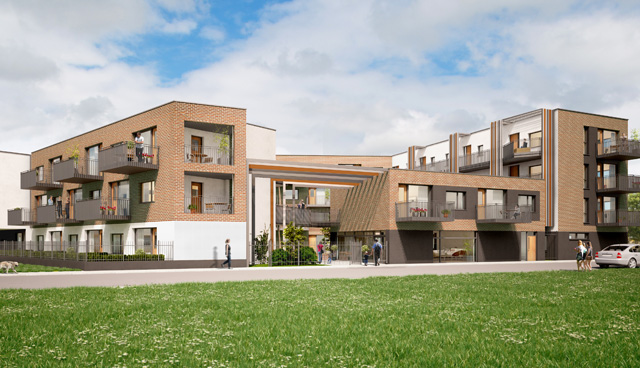
Collaboration is still the key: Unlocking the future for housing
17th May 2019
The Evolution of the Irish Residential Sector
17th May 2019Mapping land availability


Following a 32 per cent rise in commencement notices for house building in May 2019, Richard Halleron outlines the creation of an online housing land map and the Land Development Agency (LDA).
An online housing land map now features as a key part of the Rebuilding Ireland initiative. The interactive portal provides users with details of residentially zoned lands, local authority owned and land aggregation scheme sites, publicly owned sites with potential for housing development, and active private housing construction sites in the Dublin region.
The map is the result of the collation of data by the Department of Housing, Planning and Local Government from local authorities, the Housing Agency, and other State and semi-State bodies.
The data sets available include details of over 700 local authority and Housing Agency owned sites totalling some 1,700 hectares, as well as 30 sites (200 hectares) owned by State or semi-State bodies, the latter in the Greater Dublin Area and other major urban centres.
The map also shows the locations of 144 active sites, encompassing some 5,200 new dwellings which are under construction in the Dublin region.
Meanwhile, the May 2019 house building update shows a 32 per cent increase in commencement notices. The latest figures show that Dublin planning permissions, for quarter four 2018, were up 41 per cent year-on-year at 29,243. In addition, nationwide commencement notices for March 2019 were up 32 per cent at 23,851.
While the Housing Land Map represents a key step forward in the new State Housing Land Management Strategy being developed under Project Ireland 2040, the same can also be said for the new Land Development Agency (LDA). The organisation was officially launched last September.
Its core brief is to build 150,000 new homes over the next 20 years, representing the next step of Project Ireland 2040.
The new agency has an immediate focus on managing the State’s own lands to develop new homes, and regenerate under-utilised sites. In the longer term it will assemble strategic landbanks from a mix of public and private lands, making these available for housing in a controlled manner which brings essential long-term stability to the Irish housing market.
An Taoiseach, Leo Varadkar believes the LDA will come to be seen to be as significant as the decision to establish the ESB, Aer Lingus or the IDA.
The new organisation has an initial pipeline of State land which is capable of delivering 10,000 homes, with 3,000 of those homes on lands which have already been secured. The Agency is already in the process of expanding its portfolio. The LDA will have two main functions.
The first is the co-ordination of appropriate State lands for regeneration and development, opening up key sites which are not being used effectively for housing delivery. The second is that of driving strategic land assembly, working with both public and private sector landowners to smooth out peaks and troughs of land supply, stabilising land values and delivering increased affordability.

Rebuilding Ireland Housing Web Map.
The LDA is modelled on best European practice as already demonstrated in Germany and the Netherlands. By assembling land packages ahead of the planning and infrastructure stages, the agency can lower development land costs and tackle upward pressure on house prices.
The agency will be a commercial State-sponsored body, acting within a clear Government policy framework: that all public land disposals must deliver at least 40 per cent of any housing potential on such lands in the form of social (10 per cent) and affordable (30 per cent) housing.
It will establish a national centre of expertise for State bodies and local authorities, using experienced staff with expertise in project management finance, planning, development and procurement. It will be further underpinned by dedicated legislation, overseen by an independent board and provided with both the initial and long-term capital to function on a commercial basis.
Commenting on the significance of LDA in September 2018, An Taoiseach Varadkar says: “The Land Development Agency, with capital of €1.25 billion behind it, is a step change in the Government’s involvement in the housing market. We are going to build new homes and lots of them. That includes social housing, affordable housing, private housing and cost rental housing on both publicly and privately-owned land.
“While the indicators show that the numbers of new houses being built is up by more than a third compared to this time last year and is increasing month on month, we are still facing a huge challenge in meeting demand. We know we are playing catch up after our housing sector was destroyed. The Land Development Agency is a government intervention that is 50 years overdue and which, in time, I believe will be seen to be as significant as the decision to establish the ESB, Aer Lingus or the IDA.”
Minister for Housing Planning and Local Government, Eoghan Murphy TD, adds: “The consensus is that tackling boom-bust cycles of house prices depends on tackling similar cycles in land supply through State driven active land management and this is precisely what the LDA is about. The LDA will enable government to address traditional volatility in land prices as a result of land speculation as well as delays in delivering housing and strategic urban redevelopment generally as a result of delays in delivery due to disparate land ownership and cost allocation for infrastructure.
“Establishing the LDA creates a powerful new driver of urban regeneration with the lands, skillsets and capital needed that will assure housing delivery, including the social, affordable and market housing so badly needed for our citizens.”
Minister for Finance and Public Expenditure and Reform, Paschal Donohoe TD comments: “The adoption of a more pro-active land management role by the State is critical to solving the current housing crisis and creating downward pressure on land prices. The LDA will be given access to land that is already in wider State ownership or control for development, and it will have access to capital from the Ireland Strategic Investment Fund and other private finance, which it will raise itself commercially.
“This combination of land and capital for investment will enable the agency to prepare development plans for these sites and subsequently to fund the development of the sites and construction of housing on a commercial basis.
“This will enable the agency to make a significant difference to housing supply in the years ahead, which will have far wider competitiveness benefits.”
He continues: “Furthermore, the agency will be able to take a long-term strategic approach to land acquisition and management. The longer-term effect of its establishment will be to stabilise the supply and development of land for housing and wider development purposes, thus positively disrupting the traditionally upwards pressure on development land prices.”






